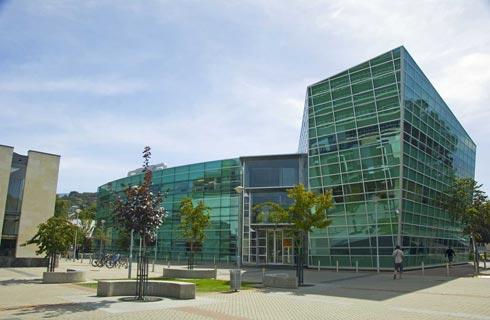Doctor of Philosophy in Marine Science

学历文凭
Ph.D.

专业院系

开学时间

课程时长

课程学费

国际学生入学条件
Have completed all of the coursework listed on our website (http://www.marine.usf.edu) under ''Undergraduate Preparation''.
Have taken the Graduate Record Examination (GRE) within 5 years preceding the application. P referred minimum scores are as follows: Verbal = 153 (59th percentile), Quantitative = 148 (32nd percentile) . Preferred minimum scores for Marine Resource Assessment concentration are: Verbal = 156 (71st percentile), Quantitative = 155 (60th percentile).
Have the commitment of a Marine Science faculty member to serve as advisor during the student's graduate studies.
research interest essay (use template from Marine Science website) -
a resume or curriculum vitae
three letters of recommendation
official transcripts of grades
GRE exam scores
Minimum test scores required to determine proficiency are: IELTS - 6.5, TOEFL (iBT – 79, PBT – 550)
A bachelor's degree from an approved regionally accredited institution (or international equivalent).
Minimum grade point average (GPA) of at least 3.00 (on a 4.00 scale) in one of the following ways:
o All completed undergraduate coursework
o All completed graduate coursework
IDP—雅思考试联合主办方

雅思考试总分
6.5
- 雅思总分:6.5
- 托福网考总分:79
- 托福笔试总分:550
- 其他语言考试:PTE-A – 53
CRICOS代码:
申请截止日期: 请与IDP联系 以获取详细信息。
课程简介
相关申请
 预科
预科 奖学金
奖学金 实习机会
实习机会 在校学习
在校学习 跨境学习
跨境学习 校园授课-线上开始
校园授课-线上开始 在线/远程学习
在线/远程学习
学校排名

世界排名251
数据源:
泰晤士高等教育世界大学排名
关于南佛罗里达大学 - INTO USA

在南佛罗里达大学(USF),国际学生可以从创新和鼓舞人心的学习社区中受益。该校的独特之处在于它是培养美国富布赖特学者人数最多的大学之一。大学为学生提供多个入学时间点。 学生可以通过本科和研究生申请直接入读学位课程。 如果他们在学术和英语技能方面需要额外的支持,他们还可以入读国际大一课程、研究生衔接课程和学术英语课程。 学习之旅的每一步都有大量的支持,因此国际学生可以实现他们的学术和职业目标。南佛罗里达大学位于最具价值的100所学校之列,也是排名前46的公立学校(2021年美国新闻与世界报道)。在过去的五年中,来自154个国家的6208名USF毕业生在48个州完成了OPT,在那里他们发展了各种雇主所要求的技能。占学生人数百分之十的国际学生将在多元化而热情的校园社区中找到家的感觉。学生可以参加600多个学生组织和竞技体育队,学校还提供健康计划以帮助学生改善健康状况。坦帕为学生提供了不可思议的体验。美国人口普查局将坦帕称为美国最多样化和融合性最高的城市之一。每个人都可以享受很多东西,例如博物馆、美术馆、购物、冒险活动以及充足的阳光。
本校相关课程

Doctor of Philosophy in Aging Studies
学历文凭
Ph.D.
开学日期
课程费用总额


Master of Accountancy
学历文凭
Masters Degree
开学日期
课程费用总额


Doctor of Philosophy in Applied Anthropology
学历文凭
Ph.D.
开学日期
课程费用总额


Master of Science in Industrial Engineering
学历文凭
Masters Degree
开学日期
课程费用总额


应用行为分析哲学博士
学历文凭
Ph.D.
开学日期
课程费用总额


Bachelor of Science in Cell and Molecular Biology
学历文凭
Bachelor Degree
开学日期
课程费用总额

其他相关课程

海洋学博士
 达尔豪斯大学
达尔豪斯大学学历文凭
Ph.D.
开学日期
课程费用总额


海洋学理学硕士
 达尔豪斯大学
达尔豪斯大学学历文凭
Masters Degree
开学日期
课程费用总额


海洋科学理学学士
 达尔豪斯大学
达尔豪斯大学学历文凭
Bachelor Degree
开学日期
课程费用总额


海洋生物学理学学士
 达尔豪斯大学
达尔豪斯大学学历文凭
Bachelor Degree
开学日期
课程费用总额


海洋生物学文学士
 达尔豪斯大学
达尔豪斯大学学历文凭
Bachelor Degree
开学日期
课程费用总额


理学学士-海洋生物学
 新不伦瑞克大学
新不伦瑞克大学学历文凭
Bachelor Degree
开学日期
课程费用总额










 美国
美国